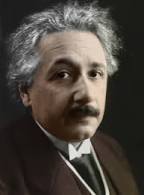Walter Issacson has done deep research and written biographies of several men you could call geniuses. Benjamin Franklin, Leonardo Da Vinci (next on my reading list), Steve Jobs, Albert Einstein. I just finished the Einstein book.

Reflecting on his career while speaking at a conference I attended, Issacson said that they all shared certain characteristics–they were rebellious, they didn’t quite fit in with their contemporaries, and they could bring in ideas from numerous sources. Think of this in terms of building a great workforce.
I was probably 10 or 11 when I first read a biography of Franklin. Even then I was impressed by his wide-ranging curiosity. He seemed to learn something about everything. Yet, he grew up poor and didn’t have the perks of wealth.
The Einstein book was enjoyable, if long. My wife said she had some trouble getting through it. I can believe it. All the stories about his wives and family troubles were hard to get through. But the detailed discussion about the developments in physics–ah, suburb. OK, so maybe she liked the family stuff and I preferred the physics.
By the way, it’s not true that he failed arithmetic as a boy. But his genius was not in math. He had friends who helped out on the math side of the theories.
Einstein didn’t accept all the common knowledge about physics of the day. As he pondered the influential experiments and thoughts of the late 19th century, he performed thought experiments. That is, he used his imagination.
In fact, one saying attributed to him concerns the importance of imagination over rote learning.
He said later in life that one doesn’t attend college to learn facts. You go to college to learn to think.
I was no doubt influenced by that statement many years ago when I formulated my description of an educated person (note that it says nothing about degrees)–you learn how to learn, you learn how to think clearly, you learn how to express yourself.
In fact, while I respect the tenacity of those who have advanced degrees, I got that out of my system early. The university shut down the program I was in. After getting accepted at a couple of other universities, I looked at the curriculum and decided to study what I wanted. I’ve always viewed a degree as a certificate that entitles the bearer entry into a club.
In that respect, I’ve always sided with the greater Marx philosopher–Groucho. “I don’t want to join any club that would want people like me as a member.”
Workforce tip: You’re going to look for minimum capability, of course. Don’t hire a programmer who thinks Java is something you drink. However, look for people who are curious, who challenge things as they are, who can balance individual work with team work. Cultivate a workplace where ideas (not personalities) form the foundation of lively and challenging discussions.





